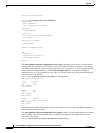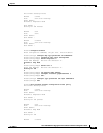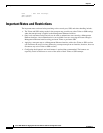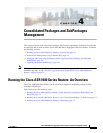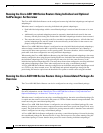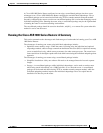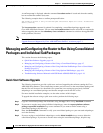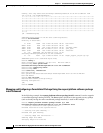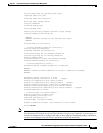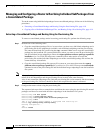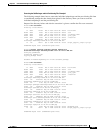
4-4
Cisco ASR 1000 Series Aggregation Services Routers Software Configuration Guide
OL-16506-17
Chapter 4 Consolidated Packages and SubPackages Management
Software File Management Using Command Sets
Table 4-1 summarizes the advantages and disadvantages of the approaches.
Software File Management Using Command Sets
Software files can be managed on the Cisco ASR 1000 Series Routers using three distinct command sets.
This section provides overviews of the following command sets:
• The request platform Command Set, page 4-4
• The copy Command, page 4-5
• The issu Command Set, page 4-5
The request platform Command Set
The request platform software package command is part of the larger request platform command set
being introduced on the Cisco ASR 1000 Series Routers. For additional information on each request
platform command and the options available with each command, see the Cisco IOS Configuration
Fundamentals Command Reference.
The request platform software package command, which can be used to upgrade individual
subpackages and a complete consolidated package, is used to upgrade software on the Cisco ASR 1000
Series Routers. Notably, the request platform software package command is the recommended way of
performing an individual subpackage upgrade, and also provides the only method of no-downtime
upgrades of individual subpackages on the router when the router is running individual subpackages.
Table 4-1 Advantages and Disadvantages of Running Individual subPackages and Consolidated
Packages
Approach Advantages Disadvantages
Individual and optional
subpackages
Note This method is
required if you
need to install any
optional
subpackages for
your system.
• Optimizes memory usage,
allowing for faster boot times
and increased traffic loads.
• Multiple software subpackages
more difficult to manage.
• Cannot be booted from TFTP or
any other network server. If you
are going to use the individual
subpackage boot method, each
individual subpackage file must
be placed in the bootflash:
directory.
• Individual and optional
subpackage files and the
provisioning file must be stored
in bootflash:.
Consolidated Package
• Easier management. Only
have to manage one file
instead of many files.
• A consolidated package file
can be stored in bootflash:, on
a USB Flash disk, or on any
TFTP or other network server.
• Slower boot times and lessened
maximum system scalability
because the larger image must be
processed at all times.





